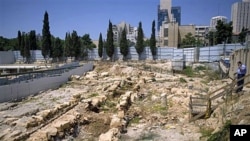The Israeli government said it has given final approval to the construction of a museum over part of an ancient graveyard in Jerusalem. The project was delayed for years by objections from local Muslims.
Israeli interior ministry spokeswoman Efrat Orbach said the Museum of Tolerance received a permit on Tuesday and construction can begin immediately, although it was not clear when that will happen.
The museum is a project of the Simon Wiesenthal Center, a U.S.-based rights group named for a famous Nazi hunter. It is located in West Jerusalem, the sector of the city that has been part of Israel since its independence in 1948.
Israel's Islamic Movement and other groups tried to block the museum on religious grounds, saying Muslim graves beneath the site should not be desecrated.
Israel's Supreme Court rejected their petition in 2008, ruling that authorities had used a small part of the ancient grave site as a municipal parking lot for decades without objections from local Islamic leaders. The museum is intended to be built over that parking lot.
Museum opponent Huda al-Imam of the Center for Jerusalem Studies told the French news agency that activists will appeal to Arab leaders and the United Nations to pressure Israel into canceling the project. She said Israeli authorities should respect the heritage of the site and not try to "delete" Palestinian identity.
The Simon Wiesenthal Center said Muslims in the Arab world have built roads, commercial centers and public buildings on their own cemeteries. The group said it is "preposterous" to hold the planned museum to a higher standard than Muslims adhere to themselves.
Some information for this report was provided by AP and AFP.




